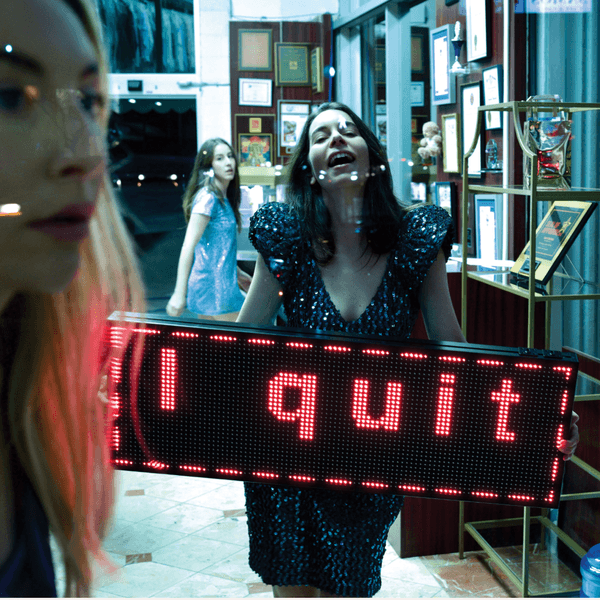"21"

Adele Adkins has had the sort of career trajectory of which dreams are made. The PR bumph tells the story quite well, actually: adorably naive bedroom musician posts demo on MySpace, is taken under the wing of West London acoustic clique, signs to XL, sells enough copies of debut record to plug British budget deficit.
The traditional next step would be to scrape together a dozen tracks between bouts of touring, release them with a dramatically reduced marketing budget, have them met with a shrug by the press, and then find yourself quietly dropped.
This is a path that Adkins need not worry about treading. There seems already to be a critical consensus forming around 21. Journalists are falling over themselves to demonstrate that they can still recognise good songwriting even when the artist in question is already, y’know, successful. Many have already decided that this is the record that will save whatever it is that needs saving this week.
We can dispense with some of the hyperbole straight away. This is not the earth-shattering piece of work that some over-excited listeners would have you believe. 21 is, however, a very good, very flawed record that, on occasion, demonstrates why Adele Adkins is just at the beginning of a potentially very special career.
Adkins’ voice is the most striking element of 21. Already impressive on her debut, it has matured into something genuinely wonderful. Her delivery is perfect; her inflection is unaffected, and remains gloriously free of the contrived cracks and trills favoured by so many of her peers.
That voice extricates Adele from several sticky situations during 21. Perhaps most importantly, it helps to mitigate the most problematic aspects of a white BRIT School graduate writing an album so fundamentally influenced by black spirituals. If I were listening to the chain gang backing of stand-out ‘Rumour Has It’ on the latest album by Duffy, or Kate Nash, or any other of the coterie of artists with whom Adele has been lumped, I would be incandescent. As it is, Adele’s performance is so natural, so free of pretence, that this appropriation barely grates at all.
Adkins inhabits her characters to such a convincing degree that it simply does not feel like an act. She regularly professes her love for Etta James and, while as far as I know Adkins has not yet had to endure the horrors with which that extraordinary woman has been forced to contend, tracks like ‘One And Only’ could easily fool you into thinking they have had comparable life experiences.
Lyrically, 21 and 19 might as well be the work of different artists. While her debut was littered with sixth form poetry, 21 is, with a few exceptions (see particularly ‘Turning Tables’, which is essentially ‘Hometown Glory’ rewritten), a touching demonstration of a burgeoning poetic sensibility. Nowhere is this more apparent than on ‘He Won’t Go’, a beautifully concise portrait of mutual dependency containing, in a two-second snippet of triplet drumming about four minutes in, the best moment on the album.
‘He Won’t Go’ also happens to be one of the tracks to receive the Rick Rubin Treatment. Much was made of the news that Adele was working with The Bearded One but, in the event, he only receives four credits. His work is instantly identifiable; tight, restrained, nuanced. His famous cover version strategy, however, meets with significantly less success here than it did on Johnny Cash’s American Recordings. The penultimate track is a cover of The Cure’s ‘Lovesong’, rendered in pseudo-Spanish guitar and all too reminiscent of the sort of thing one might expect to hear on a Tuesday night in the back room of a pub in Guildford. Similarly, early low point ‘Don’t You Remember’ is like Sheryl Crow taking on the score from Les Misérables – all faux-country melodrama, and entirely incongruous when considered in the context of the rest of the album.
It is, in fact, Paul Epworth who emerges triumphant. 2004’s favourite knob twiddler co-wrote three of the strongest tracks on 21, and his bold production is a major part of the appeal of first single ‘Rolling In The Deep’. Epworth deserves more credit for his songwriting which, entirely apart from his work with Adele, has contributed to career highs for Friendly Fires, Florence & The Machine, and Kate Nash. He won’t receive the recognition to which he is entitled, but 21 is, in great part, his album.
Regardless of producers, 21 is an impressive piece of work. It is, at its best, a record almost entirely out of time; almost completely unshackled from fad or trend, and informed solely by the artist’s own passions. Its lowest ebbs occur when Adkins tries to shoehorn herself into a style that does not fit – but, to her credit, if Rick Rubin told you to do something, you would probably do it. If Adele can resist those influences and instead sustain the remarkably high quality of songwriting that is peppered across 21, her next album (23?) will truly be something special.
Get the Best Fit take on the week in music direct to your inbox every Friday

Tropical F*ck Storm
Fairyland Codex

Loyle Carner
hopefully !

YUNGBLUD
Idols





